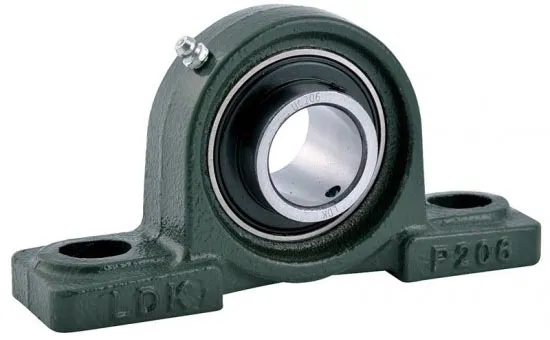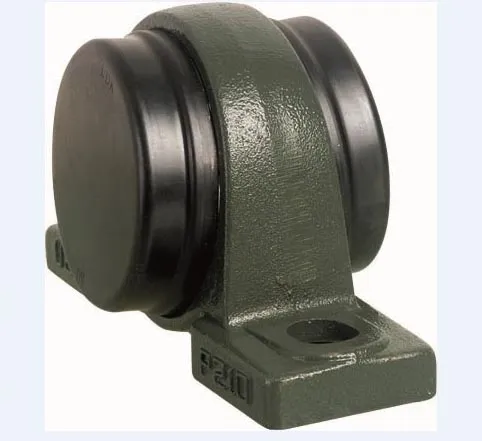Pillow block bearings are a type of bearing used to provide support for rotating shafts. They are composed of a pillow or plummer block which acts as a housing for the bearing, allowing it to be mounted to a surface. Pillow block bearings play a crucial role across many industries by reducing friction and enabling the smooth and efficient operation of rotating equipment. This article will provide an overview of pillow block bearings, explaining their basic function, applications, types, maintenance, and significance.

A pillow block bearing, also known as a plummer block bearing, consists of a pillow or plummer block housing that encases either a ball bearing or roller bearing. The housing attaches to a stationary surface while the bearing supports a rotating shaft or axle. This allows linear or rotational motion between the shaft and the housing it is mounted in.
Pillow block bearings are a crucial part of modern hardware and gear. They offer fundamental help and diminish erosion, permitting the transmission of force from engines to yield gadgets. Pillow block bearings empower smooth, effective, and dependable execution of pivoting gear across numerous basic businesses including producing, horticulture, development, food and drink, and material dealing. Their far and wide use features the significance of pillow block bearings in supporting modern action.
Pillow block bearings' primary job is to support rotating shafts and make it possible for them to rotate without encountering any friction. The bearing comprises an internal and external race which contains moving components that can be either balls or rollers. The inward race joins to the turning shaft while the external race associates with the fixed pad block lodging.
As the shaft pivots, the moving components like ball bearings move flawlessly between the races, keeping the shaft adjusted inside the lodging while at the same time limiting grating. This permits the transmission of rotational power from the shaft to the lodging with insignificant power misfortune. Tapered, spherical, cylindrical, and angular contact bearings are among the various types of roller bearings utilized in pillow blocks.
Pillow block bearings convey outspread burdens applied lined up with the shaft as well as pushed loads applied pivotally along the shaft. They balance out and uphold the shaft, decrease grating and wear, and empower the productive and dependable activity of mechanical hardware. Appropriate lubrication of the heading is fundamental to scattering heat and keeping up with smooth pivot.
Pillow block bearings have broad applications across many significant ventures that depend on turning gears. Some common applications include:
Industrial Machinery:
Pillow block bearings are pervasively utilized in weighty modern apparatus like turbines, blowers, transports, blenders, fans, and siphons. They enable reliable transmission of power in large equipment operating under high radial or thrust loads. Common examples include bearings in electric motors, pulleys, gearboxes, separators, and centrifuges.
Agricultural Equipment:
In agribusiness, pillow block bearings support transmission screws and pivoting parts in hardware like farm vehicles, collectors, grower, and water system siphons. In farm environments, they must withstand dirt, dust, and varying temperatures. Sturdy SAF agricultural pillow blocks are commonly used in farming equipment.
Construction Equipment:
Pillow block bearings assume a fundamental part in development hardware like cranes, backhoes, street rollers, and substantial blenders that go through dull movement. They must handle vibration and shock loads. Wide inner ring housing pillow blocks allow easy installation over shafts in construction equipment.
Other Industries:
Pillow block bearings are also frequently used in the food and beverage industry to support machinery used in bottling, canning, and mixing. In the packaging business, they are utilized in transports, labelers, and packaging lines. Material handling equipment like conveyors and automated picking systems also rely on pillow block bearings.
There are a few sorts of pillow block bearings intended to deal with various shaft sizes, working paces, loads, and ecological circumstances. Key criteria for selecting the appropriate pillow block bearing include:
- Load carrying capacity - determined by the shaft diameter and bearing design.
- Maximum rotational speed - limited by the construction of rolling elements.
- Environmental conditions like moisture, contamination, temperature.
- Loads - radial, thrust, or combination loads.
- Desired rigidity, noise, and vibration levels.
Common types include:
- Spherical roller bearings - handle weighty spiral and push loads at low rates.
- Cylindrical roller bearings - support weighty spiral burdens at moderate velocities.
- Tapered roller bearings - oblige joined outspread and push loads.
- Ball bearings - suitable for high speed applications with light loads.
- Angular contact bearings - manage high radial and axial loads.
- Self-aligning ball bearings - allow shaft misalignment compensation.
Legitimate choice of pillow block bearing sort and size guarantees ideal execution and administration life.
Normal investigation and upkeep are fundamental for pillow block bearings to work appropriately over lengthy help stretches. Important aspects of pillow block maintenance include:
- Lubrication - adequate lubricant levels diminish erosion and disperse heat. Lacking lubrication can prompt overheating.
- Pollution control - soil, residue, and dampness entrance can harm the bearing. Seals help protect the bearing internals.
- Inspection - check for signs of wear, loose fittings, noise or vibration issues.
- Mounting - improper mounting, misalignment or unbalanced shafts lead to premature failures.
- Overload - exceeding the load ratings causes internal damage to bearings.
Common pillow block issues include worn rolling elements, pitting, cracked races, excess play or looseness, creaking noises, wobble, and overheating. Replacing compromised bearings promptly helps prevent further equipment damage.
Pillow block bearings are an indispensable component across industrial machinery, enabling efficient transfer of rotary motion. Their housing and built-in bearings provide rigid support for shafts, help maintain alignment, reduce friction, and dissipate heat. Proper bearing selection, mounting, lubrication and maintenance contributes to optimized performance and longevity. Given their widespread use in critical equipment, pillow block bearings play an essential role in supporting industrial productivity across diverse sectors. Their ongoing development continues to provide benefits of reduced operating costs, equipment reliability, and operational efficiency.
Deyuan Smart Technology (Fujian) Co., Ltd is a leading pillow block bearing manufacturer, offering core services focused on product quality, reliability verification, and customer satisfaction. Our dedicated R&D capabilities ensure that we remain at the forefront of technological advancements, enabling us to continuously improve and innovate our products to meet the evolving needs of our customers.

Our advanced measurement center is equipped with various precision measurement facilities, allowing us to maintain strict quality control and precision throughout the manufacturing process. Additionally, our testing abilities include fatigue life, noise/vibration, tensile strength, load capacity comparison, mud slurry, and salt spray tests, ensuring that our products meet the highest standards for performance and durability.
At Deyuan Smart Technology, we take great pride in the recognition our product quality and services have garnered from customers in the industry. We strive to provide exceptional products and services that meet and exceed customer expectations. You can trust us as your reliable partner in the pillow block bearing industry. For further inquiries or to discuss your specific requirements, please contact kzhang@ldk-bearings.com or call +86-592-580 7618. We look forward to the opportunity to work with you.
References:
Bhadeshia, Harshad K. D. "Bearing steels: into the 21st century." Bearing steel technology. ASTM International, 2002.
Domblesky, Joseph P., and Joacon F. Handschuh. "A review of oxidational wear in selected bearing steels and coatings systems." Tribology transactions 44.3 (2001): 359-371.
Ebert, F. J. "The influence of material properties on the lubrication of rolling bearings." Tribology series 11 (1985): 501-508.
Harris, Tedric A., and Michael N. Kotzalas. Rolling bearing analysis. Vol. 2. New York: Wiley, 2001.
Jones, A. B. "Ball bearings and roller bearings." Mechanisms and mechanical devices sourcebook 5 (2007).
Kim, Young Kook, and Yong Bum Yoon. "A study on the lubrication characteristics of high-speed ball bearings considering centrifugal force effect." Tribology Transactions 54.4 (2011): 527-534.
Ku, Peter M., et al. "Lubrication performance of ball bearings." (1972).
Moyer, Leighton K. Spherical roller bearings. Ulan Press, 2012.
Wang, Q. Jane, and Alan K. Tieu. "A simulation for dynamics of ball bearings." Journal of tribology 124.1 (2002): 217-226.
Zaretsky, Erwin V. "Rolling bearing steels–A technical and historical perspective." Materials Science and Technology 28.1 (2012): 58-69.